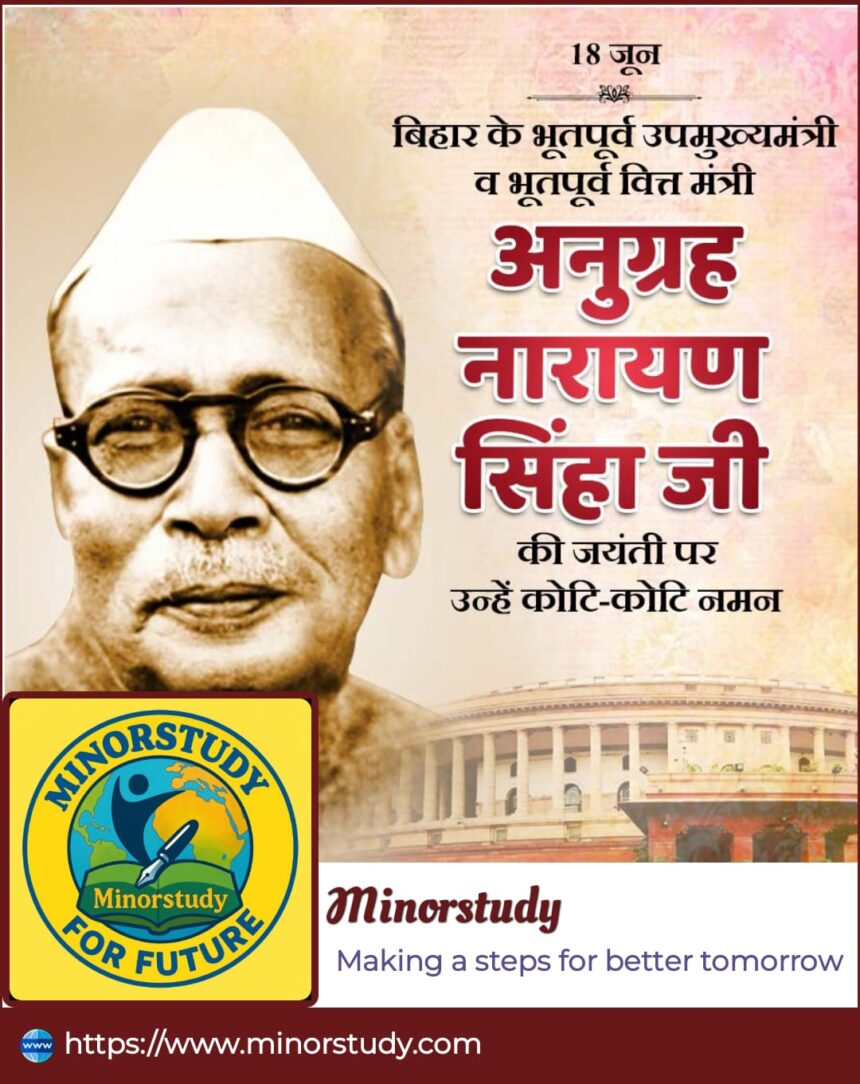🌟 1. Introduction
Anugrah Narayan Sinha: Known as ‘Bihar Vibhuti’, Anugrah Narayan Sinha (18 June 1887 – 5 July 1957) was a towering figure in Indian politics and freedom struggle. A scholar, Gandhian, reformer, and the first Deputy Chief Minister of Bihar, his life had profound impact—especially as a Member of the Constituent Assembly. This article explores his biography, achievements, timeless values, FAQs, commemorations, and everyday relevance.
- 🌟 1. Introduction
- 📜 2. Anugrah Narayan Sinha Early Life & Education
- ✊ 3. Freedom Movement Involvement
- 🏛️ 4. Anugrah Narayan Sinha Political & Constitutional Contributions
- 🧭 5. Timeline at a Glance
- 💎 6. 6 Anugrah Narayan Sinha Less-Known Facts
- 🎯 7. FAQs (Your Burning Questions Answered)
- 🌱 8. Significance & Impact on Daily Life
- 📝 9. Wishing & Observance Ideas
- ✔️ 10. Key Takeaways
- 🏁 11. Conclusion
- 🌿 Final Reflection
📜 2. Anugrah Narayan Sinha Early Life & Education
Born on 18 June 1887 in Poiwan, Gaya district (now Aurangabad), Bihar ganeshiasacademy.wordpress.com+6constitutionofindia.net+6dbpedia.org+6en.wikipedia.org+3ganeshiasacademy.wordpress.com+3amcollegegaya.ac.in+3.
Earned an M.A. in History from the University of Calcutta in 1914 and served as Professor at T. N. J. College, Bhagalpur kids.kiddle.co+2constitutionofindia.net+2kamat.com+2.
Took up flood-relief work in Bhagalpur and later enrolled at Patna Bar in 1916 constitutionofindia.net+1kamat.com+1.
✊ 3. Freedom Movement Involvement
Inspired by Gandhi, he quit his law practice in 1917 to join the Champaran Satyagraha, India’s first large-scale civil resistance campaign dbpedia.org+5en.wikipedia.org+5en.wikipedia.org+5.
Taught at Bihar Vidyapeeth (founded by Rajendra Prasad), mentoring young activists such as Jayaprakash Narayan kamat.com+3en.wikipedia.org+3kids.kiddle.co+3.
Organized the 1922 Gaya Congress, became General Secretary of both AICC and Bihar Congress kids.kiddle.co+3en.wikipedia.org+3constitutionofindia.net+3.
Led Bihar’s participation in the Civil Disobedience Movement (1930); jailed for 15 months (1933–34) constitutionofindia.net+2en.wikipedia.org+2kids.kiddle.co+2.
Post-1934 Nepal–Bihar earthquake, served as Vice-President of the relief committee under Rajendra Prasad en.wikipedia.org.
🏛️ 4. Anugrah Narayan Sinha Political & Constitutional Contributions
Elected to Bihar Legislative Assembly (1936); became Deputy Premier and Finance Minister in the first Congress provincial government in 1937 dbpedia.org+5en.wikipedia.org+5constitutionofindia.net+5.
Served as Bihar’s first Deputy Chief Minister & Finance Minister from 1946 until 1957 amcollegegaya.ac.in+1dbpedia.org+1.
Was a respected Member of the Constituent Assembly, contributing to framing India’s Constitution amcollegegaya.ac.in+1mintageworld.com+1.
Continued tenure in independent India’s first Parliament.
🧭 5. Timeline at a Glance
| Year | Event |
|---|---|
| 1887 | Born in Poiwan, Gaya (18 June) en.wikipedia.org+3constitutionofindia.net+3ganeshiasacademy.wordpress.com+3 |
| 1914 | Earned M.A. and became Bhagalpur College professor |
| 1917 | Joined Champaran Satyagraha |
| 1922–23 | Organized Gaya Congress; became General Secretary, AICC/Bihar |
| 1933–34 | Imprisoned and led earthquake relief efforts |
| 1936–37 | MLA and Deputy Premier, Bihar |
| 1946–57 | Deputy CM & Finance Minister, Bihar |
| 1946 | Member, Constituent Assembly |
| 1957 | Passed away on 5 July |
💎 6. 6 Anugrah Narayan Sinha Less-Known Facts
Known affectionately as ‘Bihar Vibhuti’ for shaping modern Bihar en.wikipedia.org+7indianculture.gov.in+7constitutionofindia.net+7.
Mentor to future leaders; taught Jayaprakash Narayan.
Folded flood relief work into education and legal careers.
Resigned in protest during WWII when Congress ministries exited office in 1939 en.wikipedia.org+4en.wikipedia.org+4kids.kiddle.co+4.
Honored by a commemorative postage stamp issued by Indian Postal Department mintageworld.com.
Multiple institutions bear his name: e.g., Anugrah Memorial Law College (Gaya, est. 1964) en.wikipedia.org and Anugrah Narayan College (Patna) en.wikipedia.org+15en.wikipedia.org+15constitutionofindia.net+15.
🎯 7. FAQs (Your Burning Questions Answered)
Q1: Why is Anugrah Narayan Sinha significant in India’s history?
A: He was a freedom fighter, social reformer, key provincial leader, and one of the architects of the Indian Constitution.
Q2: What roles did he play in Bihar’s politics?
A: He served as Deputy Premier (1937), and post-independence, as first Deputy Chief Minister and Finance Minister (1946–57).
Q3: How did he contribute to the Constituent Assembly?
A: As a member, he participated in debates shaping the Constitution’s federal structure, social equity, and governance provisions.
Q4: What exemplified his Gandhian spirit?
A: He abandoned his law career for Champaran Satyagraha (1917), engaged in nonviolent resistance repeatedly, and dedicated himself to relief work.
Q5: How is his legacy celebrated?
A: Educational institutes named after him, commemorative postage stamps, memorial lectures, and annual remembrance events.
🌱 8. Significance & Impact on Daily Life
Inclusive governance: As Finance Minister, he prioritized balanced development across social strata.
Ethical leadership: Led with integrity—resigned on moral grounds, modeled principled governance.
Education & empowerment: Deep commitment shown through teaching and institution building.
Civil service mindset: Stood by public service—support during disasters and epidemic relief.
Everyday insights:
Prioritize ethics over expedience, take public responsibility seriously, uplift weaker sections, and serve communities during crises.
📝 9. Wishing & Observance Ideas
On his birth or death anniversary, you could:
Host a knowledge seminar on Gandhian leadership and constitutional values.
Organize community service drives—health camps, education kits for underprivileged children.
Mark it with a message:
“Honoring the legacy of Bihar’s visionary, Anugrah Babu—may his values guide us toward inclusive progress!”Share memorable quotes from his speeches emphasizing justice and public welfare.
Start essay contests/scholarships: “How principles like his can shape modern governance.”
✔️ 10. Key Takeaways
Embrace moral courage in leadership.
Uphold public welfare above personal gain.
Value education as a pathway to empowerment.
Prioritize transparency and accountability in service.
🏁 11. Conclusion
Anugrah Narayan Sinha was more than a politician and constitutional member—he was a beacon of integrity, vision, educational zeal, and rural upliftment. His Gandhian spirit, resilience, and administrative foresight still inform ethical leadership today. As ‘Bihar Vibhuti’, his imprint on modern Bihar and Indian polity is lasting—and an inspirational guide for daily conduct, community engagement, and leadership rooted in conscience.
🌿 Final Reflection
Let us embrace Anugrah Babu’s ideals every day:
Think ethically, lead transparently,
Serve others selflessly, especially in times of need,
And carry forward the vision of an inclusive, just, knowledge-driven society.









Whoa plenty of terrific information.
Excellent beat ! I would like to apprentice while you amend your web site, how could i subscribe for a blog website? The account helped me a acceptable deal. I had been tiny bit acquainted of this your broadcast offered bright clear concept
Wow, superb blog structure! How long have you been running a blog for? you make blogging glance easy. The full look of your web site is excellent, let alone the content material!